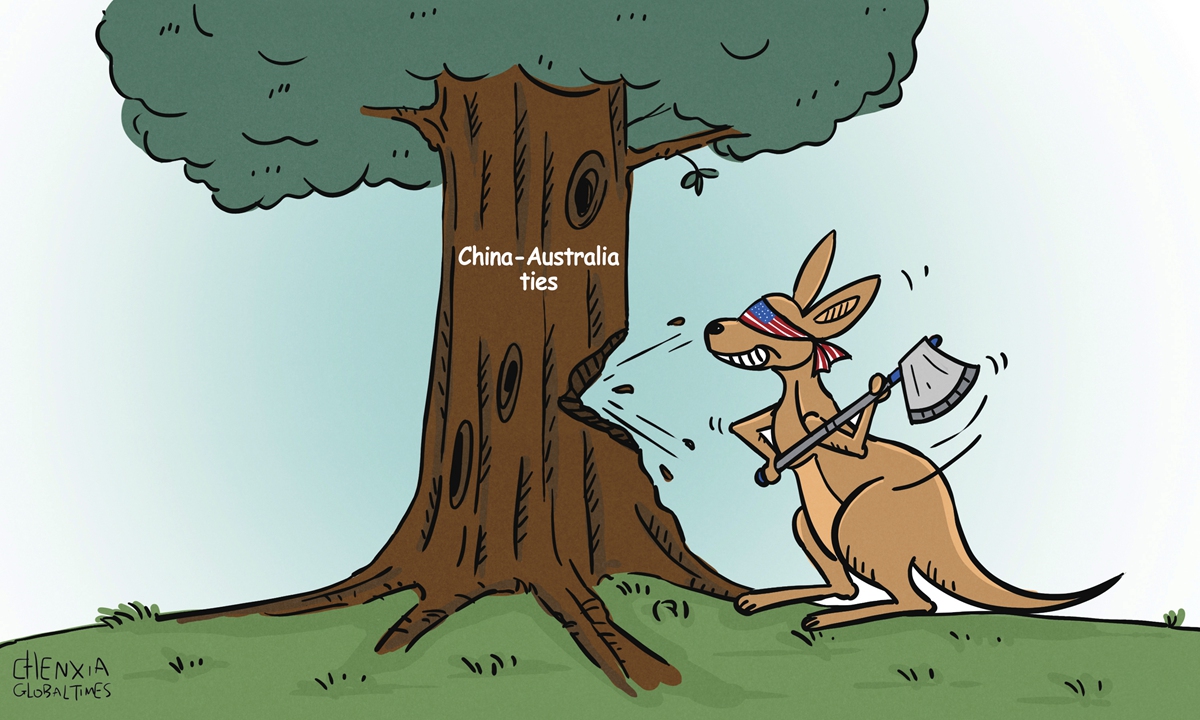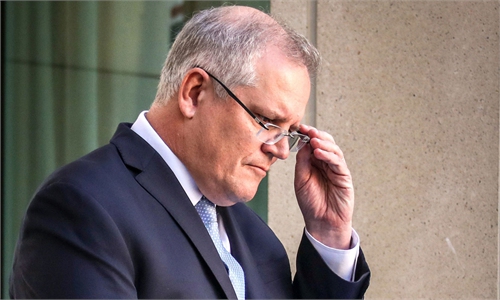Will criticism of Turnbull, Rudd make a difference on Morrison's China policy?

Illustration: Chen Xia/GT
It is very rare for a sitting head of state to be criticized by a predecessor, so it is exceptionally uncommon that two of Australia's former prime ministers, Kevin Rudd and Malcolm Turnbull, both spoke out at a webinar on Tuesday in unison with strong disapproval of the China policy of the current administration in Canberra under Scott Morrison.It is a naked fact that the Morrison government has wreaked unprecedented havocs upon Australia's relations with China. The previously constructive and mutually beneficial comprehensive strategic partnership between Australia and China has been recklessly ravaged to an almost irreparable point. Constant accusatory tones set with megaphone diplomacy have replaced mutual respect and trust. High-level officials in Canberra have even been preposterously instigating military confrontation with China, alleging that "drums of war" are beating for the Australian Defence Force to fight with the China's People's Liberation Army.
There are certainly domestic politics at play. Morrison and his government have been putting up, in Turnbull's words, an "Antipodean Trump performance, flinging abuse left, right and center" for their own partisan interests. There seems to be a championship contest of hairy-chested bellicose Aussie politicians. This is creating a toxic culture for Australia's political arena. It is misleading and deluding the public with the discreditable creation of a demonized image of China.
When sentiments of fear have been stoked up, self-interested politicians shamelessly profit from their crafty moves by ramping up the China threat theory. Australia's long term national interest has simply been cast aside for petty and ephemeral political gains.
What makes matter even worse is Canberra's obsessive attachment to Washington's anti-China strategy. It is indeed spearheading the scare and smear campaign with what Rudd called "the rhetorical overdrive stick." On a number of issues, Canberra has outdone Washington and many of its other allies to frame and blame China. This has entailed imposing discriminatory regimes to thwart China's lawful business initiatives, interfering with China's cooperation and investment projects with other countries, especially in the South Pacific, and challenging a series of guardrail "bottom-line issues," in particular those related to Xinjiang, Hong Kong and Taiwan.
Such perverse hostilities seem to have become interminable and customary with Morrison, along with the right wing in his administration. In his recent response to the latest IPCC (Intergovernmental Panel on Climate Change) report on global climate change, Morrison once again imprudently attempted to shift the public focus by maliciously accusing and making unreasonable demands to Beijing in order not to set a net zero target for Australia's carbon emission. There is a very aggressive tone of antagonism in his mind-set about China, a kind of belligerence without any regard of the likely costs to the bilateral relations.
One egregious aftermath is that the Chinese community in Australia has been seriously impacted in such a toxic atmosphere of hate and rancor. A Lowy Institute survey conducted earlier this year revealed an outrageous fact: Almost one-in-five respondents say they have been physically threatened or attacked because of their heritage and about a third said they had been verbally abused. Australia prides itself of being a nation of cultural and social tolerance and diversity. But the current prevailing political animosity toward China has clearly undermined "the success of our (Australia's) multicultural society" with a resurgence of bellicose racism and White supremacism.
Both Rudd and Turnbull rightly criticized Canberra's "grossly irresponsible and reckless language" as "absolutely contrary to Australia's national interests." On a separate occasion, Australia's Deputy Prime Minister Barnaby Joyce also urged his government to exert caution in its China policy.
"Talk less, do more," this is what Rudd counseled Morrison when dealing with China. However, it is not merely Canberra's incendiary words, but injurious deeds, that have propelled the bilateral relations into the downward spiral. Australia has its own national interest to prioritize rather than serving Washington's strategy to preserve its global hegemony. It therefore takes prudence and wisdom for the Morrison government to think wisely before it leaps into the anti-China trap set up by Washington.
The author is president of the Chinese Association of Australian Studies, and professor and Director of the Australian Studies Centre, East China Normal University. opinion@globaltimes.com.cn


